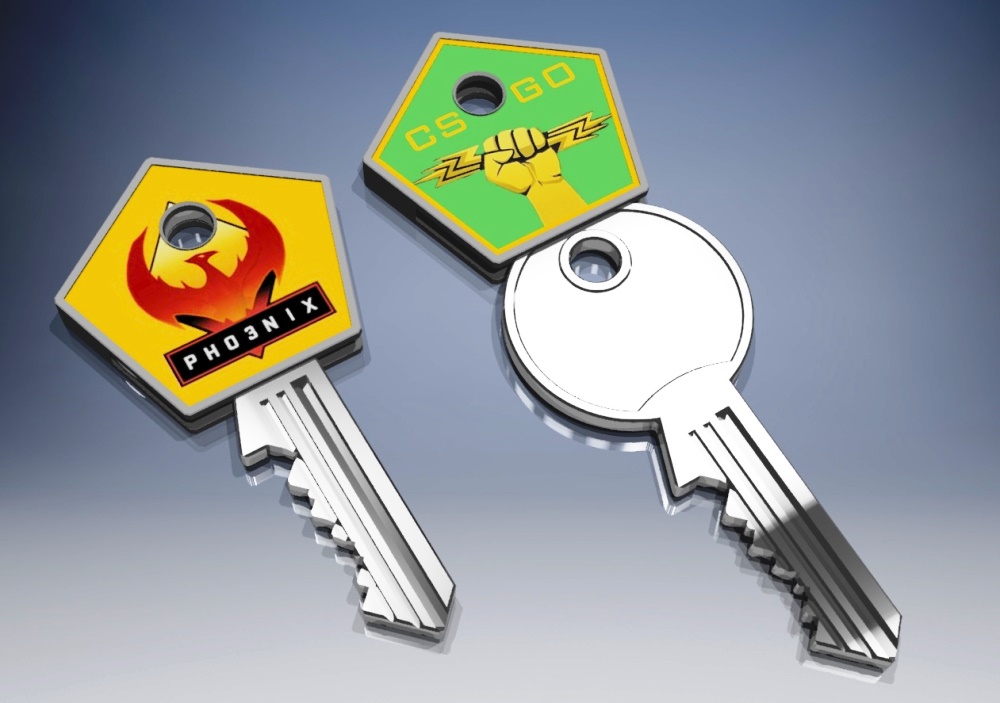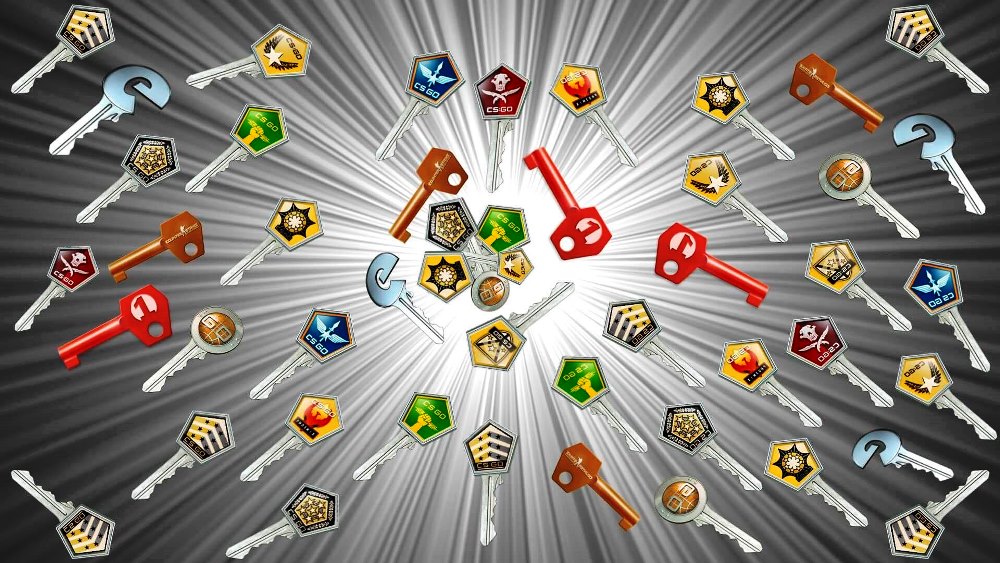
In CS:GO, there are several ways to obtain keys for cases, which are used to unlock them and reveal the contents inside.
Here are the available methods to acquire keys:
- Steam Community Market: The Steam Community Market is a platform where players can buy and sell in-game items, including CS:GO keys. You can browse the market and purchase keys directly from other players using your Steam Wallet funds or a payment method linked to your Steam account.
- In-Game Store: Within CS:GO, you can also purchase keys directly from the in-game store. To access the store, launch CS:GO and click on the “Store” tab. From there, you can browse and buy keys using the available payment options.
- Trade with other players: CS:GO has an active trading community, and it’s possible to obtain keys by trading with other players. You can find trading partners through forums, trading websites, or by interacting with other players in the game. Make sure to use caution when trading and verify the reputation of the people you trade with to avoid scams.
- Drops and rewards: Occasionally, CS:GO keys can be obtained as drops or rewards by participating in official tournaments, events, or promotions organized by Valve or third-party organizers. These keys are usually given as prizes and can be quite rare.
- External marketplaces: Apart from the Steam Community Market, there are external marketplaces where you can buy CS:GO keys from other players. Websites such as Bitskins, OPSkins, and DMarket provide platforms for buying and selling CS:GO items, including keys. Remember to exercise caution and use reputable platforms to ensure safe transactions.
It’s important to note that purchasing and trading CS:GO keys is subject to the terms and conditions set by Valve Corporation, the developer of CS:GO. Additionally, be mindful of potential scams or fraudulent activities when engaging in transactions involving virtual items.

Steam Community Market
The Steam Community Market is an online platform provided by Valve Corporation, the company behind Steam, where players can buy and sell in-game items, including CS:GO keys.
Here’s how the Steam Community Market works:
- Accessing the Market: To access the Steam Community Market, you need to have a Steam account and the Steam client installed on your computer. Once you’re logged into your Steam account, you can access the Community Market through the Steam client or by visiting the Steam Community Market website.
- Searching for CS:GO Keys: Once you’re on the Community Market page, you can use the search bar at the top of the page to search for CS:GO keys. Type “CS:GO key” or the specific name of the key you’re interested in, and click on the search button.
- Browsing Listings: The search results will display the available listings for CS:GO keys. You can browse through the listings to see the prices set by sellers and the quantities available. The listings will also indicate whether the keys are tradable or marketable.
- Making a Purchase: If you find a listing that suits your needs, click on it to view more details about the listing, including the seller’s information and the quantity available. You can then choose to buy the key by clicking on the “Buy” button and following the instructions for payment. The purchase will be made using your Steam Wallet funds or a payment method linked to your Steam account.
- Listing Items for Sale: If you have CS:GO keys that you want to sell, you can also list them on the Steam Community Market. To do this, go to the “Sell an Item” section on the Community Market page and choose the CS:GO key you want to sell from your inventory. Set the price for your listing, and it will be visible to other Steam users who can choose to purchase it.
- Fees and Restrictions: It’s important to note that the Steam Community Market charges fees for each transaction. These fees vary depending on the item being sold. Additionally, there may be restrictions on the number of listings you can create and the number of items you can sell within a specific time period.
Remember to exercise caution when using the Steam Community Market and ensure that you are dealing with reputable sellers to avoid scams or fraudulent activities.
In-Game Store
In CS:GO, the in-game store is another option for obtaining keys for cases.
Here’s how you can use the in-game store to purchase keys:
- Launch CS:GO: Open the CS:GO game on your computer and ensure that you are logged in to your Steam account.
- Access the Store: Once you are in the CS:GO main menu, click on the “Store” tab located at the top of the screen. This will take you to the in-game store.
- Browse the Store: In the store, you will find various items available for purchase, including cases and keys. Look for the section that offers CS:GO keys.
- Select the Key: Within the CS:GO keys section, you will see different types of keys corresponding to the different cases available in the game. Choose the key that corresponds to the case you want to open or the key you prefer.
- Add to Cart: Once you have selected the desired key, click on the “Add to Cart” or “Buy Now” button. This will add the key to your virtual shopping cart.
- Proceed to Checkout: After adding the key to your cart, you will need to proceed to the checkout page. Follow the prompts on the screen to confirm your purchase.
- Payment: The in-game store will prompt you to select a payment method for your purchase. You can use your Steam Wallet funds or choose a different payment option linked to your Steam account.
- Complete the Transaction: Once you have selected your payment method, review your order details, and confirm the purchase. The key will then be added to your inventory, ready to be used to unlock cases.
It’s worth noting that the prices of keys in the in-game store may vary compared to the Steam Community Market or other external marketplaces. Additionally, the availability of certain keys in the in-game store might be limited based on your region or the current game updates.
Trade with other players
Trading with other players is a popular method to obtain CS:GO keys.
Here’s how you can trade with other players:
- Find Trading Partners: To start trading, you’ll need to find other players who are interested in trading CS:GO keys.
There are several ways to connect with potential trading partners:
- In-Game: Engage with other players within CS:GO by joining trading servers or participating in community hubs. You can communicate with players, make offers, and negotiate trades.
- Steam Community: Utilize the Steam Community forums, groups, or trading subreddits to connect with other CS:GO players looking to trade keys. You can post trade offers, respond to trade requests, or browse existing trade listings.
- Trading Websites: Numerous websites are dedicated to CS:GO trading, where you can list your available keys and browse other players’ offers. Websites like CS:GO Lounge, CS.TRADE, or Reddit’s /r/GlobalOffensiveTrade subreddit are popular platforms for CS:GO trading.
- Negotiate and Make Offers: Once you have found potential trading partners, you’ll need to negotiate the terms of the trade. Communicate with the other party to discuss which items you are interested in trading and what they are willing to offer in return. You can negotiate the number of keys to be exchanged, other CS:GO items, or even Steam Wallet funds.
- Verify and Assess Reputation: Before proceeding with any trade, it’s essential to assess the reputation and trustworthiness of the trading partner. Check their Steam profile, SteamRep reputation, or reputation on trading websites to ensure they have a good track record. You can also consult third-party reputation-checking services like SteamRep or reputation threads on trading forums.
- Execute the Trade: Once both parties agree on the trade terms, you can proceed with the trade process. CS:GO trades are typically conducted through the Steam trading system. Add the other party as a friend on Steam, initiate a trade, and use the trade interface to add the agreed-upon items, including the CS:GO keys. Review the items and ensure everything is correct before confirming the trade.
- Be Cautious: When engaging in trades with other players, it’s important to exercise caution and be aware of potential scams or fraudulent activities. Avoid trading with individuals with low reputation, be cautious of impersonators or middleman scams, and carefully review any trade offers or requests before accepting.
Remember to follow Valve’s terms of service and guidelines when trading CS:GO items, and be mindful of the risks associated with trading virtual items.
Drops and rewards
Drops and rewards are another way to obtain CS:GO keys.
Here’s how drops and rewards work in CS:GO:
- Official Tournaments and Events: Valve and third-party organizers often host official CS:GO tournaments and events. These events may offer drops and rewards to participants. Drops are randomly awarded to viewers or players who have linked their Steam account to the event. Drops can include various items, including CS:GO keys.
- In-Game Operation Passes: CS:GO periodically releases Operations, which are limited-time events that introduce new maps, missions, and gameplay features. Players can purchase an Operation Pass to access exclusive content and rewards. Some Operations include key drops as part of their reward system, allowing players to earn keys by completing missions or reaching specific milestones.
- Major Championships: CS:GO Majors are Valve-sponsored tournaments that feature top teams competing for a significant prize pool. During Majors, Valve often provides in-game souvenir packages to viewers who watch the matches. These packages can be randomly dropped to eligible viewers and may contain CS:GO keys among other collectible items.
- Promotions and Events: Valve occasionally runs promotions or events where players can earn drops or rewards, including CS:GO keys. These promotions can include limited-time events, sales, or community events. It’s worth keeping an eye on official CS:GO announcements, social media channels, and the in-game news section for information on such promotions.
To be eligible for drops and rewards, make sure your Steam account is in good standing, linked to your CS:GO profile, and you meet any specific requirements set by Valve or the event organizers. Drops are typically randomized, so there is no guarantee of receiving a key or any specific item. However, participating in events and watching CS:GO tournaments can increase your chances of receiving drops and rewards.
Note that drops and rewards availability and mechanics may vary depending on the specific event or promotion. Always refer to official sources or announcements for accurate and up-to-date information on drops and rewards in CS:GO.
External marketplaces
In addition to the Steam Community Market, there are external marketplaces where you can buy and sell CS:GO keys. These platforms provide alternative options for acquiring keys.
Here are some popular external marketplaces:
- Bitskins: Bitskins is a well-known marketplace for buying and selling CS:GO items, including keys. It offers a wide selection of items and provides a secure and user-friendly platform for transactions. Users can list their keys for sale or browse the marketplace to find keys at competitive prices.
- OPSkins: OPSkins was one of the largest CS:GO marketplaces, but it ceased operations in 2018. However, it has since transitioned to a new platform called “WAX ExpressTrade” where users can trade CS:GO items, including keys, with other users. It’s important to note that WAX ExpressTrade operates independently of the Steam platform.
- DMarket: DMarket is another popular marketplace for trading CS:GO items, including keys. It offers a range of items for various games, including CS:GO. Users can buy and sell keys directly on the platform, and transactions are conducted using the DMarket’s virtual currency.
When using external marketplaces, it’s crucial to exercise caution and ensure you are using reputable platforms. Research the marketplace, check user reviews, and consider the platform’s policies and fees before engaging in transactions. It’s also important to adhere to any regulations or guidelines set by the marketplace to ensure a safe and legitimate trading experience.
Remember that trading outside of the Steam Community Market or using external marketplaces may involve additional risks, as it operates outside of Valve’s ecosystem. Be vigilant, verify the reputation of sellers or buyers, and take necessary precautions to avoid scams or fraudulent activities.


